|
|
|
Sort Order |
|
|
|
Items / Page
|
|
|
|
|
|
|
| Srl | Item |
| 1 |
ID:
183147
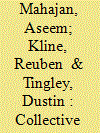

|
|
|
|
|
| Summary/Abstract |
International climate negotiations occur against the backdrop of increasing collective risk: the likelihood of catastrophic economic loss due to climate change will continue to increase unless and until global mitigation efforts are sufficient to prevent it. We introduce a novel alternating-offers bargaining model that incorporates this characteristic feature of climate change. We test the model using an incentivized experiment. We manipulate two important distributional equity principles: capacity to pay for mitigation of climate change and vulnerability to its potentially catastrophic effects. Our results show that less vulnerable parties do not exploit the greater vulnerability of their bargaining partners. They are, rather, more generous. Conversely, parties with greater capacity are less generous in their offers. Both collective risk itself and its importance in light of the recent Intergovernmental Panel on Climate Change report make it all the more urgent to better understand this crucial strategic feature of climate change bargaining.
|
|
|
|
|
|
|
|
|
|
|
|
|
|
|
|
| 2 |
ID:
183145
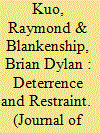

|
|
|
|
|
| Summary/Abstract |
Multinational military exercises are among the most notable demonstrations of military cooperation and intent. On average, one is initiated every 8.9 days. But it has often been argued that joint military exercises (JMEs) increase the risk of war. Using a relational contracting approach, we claim that formal military alliances mediate the effect of JMEs. Exercises and alliances serve complementary functions: The former allows targeted responses to military provocations by adversaries, while the latter provides institutional constraints on partners and establishes a partnership’s overall strategic limitations. In combination, alliances dampen the conflict escalation effects of exercises, deterring adversaries while simultaneously restraining partners. We test this theory using a two-stage model on directed dyadic data of JMEs from 1973 through 2003. We find that JMEs in general do not escalate conflict, and that JMEs conducted with allies in particular reduce the probability of conflict escalation.
|
|
|
|
|
|
|
|
|
|
|
|
|
|
|
|
| 3 |
ID:
183149
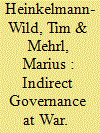

|
|
|
|
|
| Summary/Abstract |
Instead of attacking their adversaries directly, states often do so indirectly by supporting rebel groups. While these support relationships vary considerably, existing research lacks a comprehensive account thereof. To explain states’ choice of support, we suggest differentiating between two modes of support relationships according to the control opportunities they offer states over rebels: while delegation enables “hands-on” control, “hands-off” orchestration allows for plausible deniability and does not harm rebels’ local legitimacy. We argue that sponsors prefer orchestration when “hands-on” control can be substituted by goal alignment or competition; and they prefer delegation when the conflict is highly salient. Tests using global data for the period 1975-2009 support the first two expectations. Surprisingly, states’ capabilities also render “hands-off” orchestration more likely. The paper advances the understanding of external rebel support by transferring insights from indirect governance theory to the study of indirect wars and putting it to statistical test.
|
|
|
|
|
|
|
|
|
|
|
|
|
|
|
|
| 4 |
ID:
183151
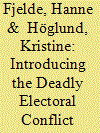

|
|
|
|
|
| Summary/Abstract |
This article introduces the Deadly Electoral Conflict dataset (DECO): a global, georeferenced event dataset on electoral violence with lethal outcomes from 1989 to 2017. DECO allows for empirical evaluation of theories relating to the timing, location, and dynamics of deadly electoral violence. By clearly distinguishing electoral violence from related (and sometimes concurrent) instances of organized violence, DECO is particularly suitable for investigating how election-related violence is connected to other forms of violent political contention. In the article, we present the theoretical and methodological underpinnings of the data collection and discuss empirical patterns that emerge in DECO. We also demonstrate one potential use of DECO by examining the association between United Nations peacekeeping forces and the prevalence of deadly electoral violence in conflict-affected countries.
|
|
|
|
|
|
|
|
|
|
|
|
|
|
|
|
| 5 |
ID:
183150


|
|
|
|
|
| Summary/Abstract |
This article introduces CShapes 2.0, a GIS dataset that maps the borders of states and dependent territories from 1886 through 2019. Our dataset builds on the previous CShapes dataset and improves it in two ways. First, it extends temporal coverage from 1946 back to the year 1886, which followed the Berlin Conference on the partition of Africa. Second, the new dataset is no longer limited to independent states, but also maps the borders of colonies and other dependencies, thereby providing near complete global coverage of political units throughout recent history. This article explains the coding procedure, provides a preview of the dataset and presents three illustrative applications.
|
|
|
|
|
|
|
|
|
|
|
|
|
|
|
|
| 6 |
ID:
183146
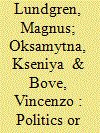

|
|
|
|
|
| Summary/Abstract |
International organizations face a trade-off between the need to replace poorly performing leaders and the imperative of preserving the loyalty of influential or pivotal member states. This performance-politics dilemma is particularly acute in UN peacekeeping. Leaders of peacekeeping operations are responsible for ensuring that peacekeepers implement mandates, maintain discipline, and stay safe. Yet, if leaders fail to do so, is the UN Secretariat able and willing to replace them? We investigate newly collected data on the tenure of 238 civilian and military leaders in thirty-eight peacekeeping operations, 1978 to 2017. We find that the tenures of civilian leaders are insensitive to performance, but that military leaders in poorly performing missions are more likely to be replaced. We also find evidence that political considerations complicate the UN’s efforts at accountability. Holding mission performance constant, military leaders from countries that are powerful or contribute large numbers of troops stay longer in post.
|
|
|
|
|
|
|
|
|
|
|
|
|
|
|
|
| 7 |
ID:
183148


|
|
|
|
|
| Summary/Abstract |
What is the relationship between natural resources and rebel governance? Previous studies have argued that resource rich groups have fewer incentives to provide social services. We argue, however, that even well-funded rebels may have incentives to provide some social services to civilians. Specifically, rebel groups profiting from the extraction of natural resources should be more likely to offer health care services as a means of ensuring a dependable civilian workforce than groups who do not profit from natural resources. Using data on both the extraction of natural resources and social service provision by rebel groups, we find strong empirical evidence to support our argument. We conclude with implications for scholars and policymakers.
|
|
|
|
|
|
|
|
|
|
|
|
|
|
|
|
|
|
|
|
|